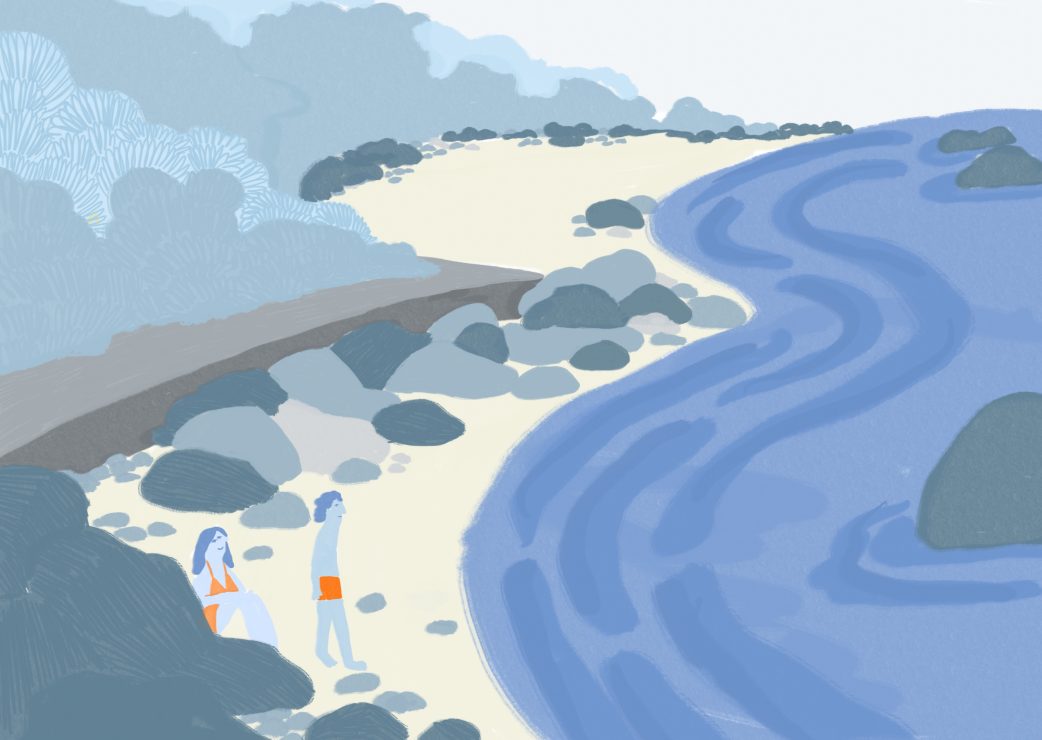How UVic students are finding community and improving their mental health with cold plunges

Illustration by Chloe Latour.
It is six degrees and the water is absolutely freezing, but this is the happiest I’ve been in months.
Moving away from my small hometown in Saskatchewan last September hit me hard. I never thought it would. I was thrilled to start my life on the coast, but I didn’t realize that as freeing as being on your own is, you have to learn how to be alone. Growing up as the youngest of four, there was always noise, a dinner to come home to, and people to see. Then, one afternoon in September there wasn’t.
I’ve always been introverted, so at first, this was the silence I craved after 18 years of loud brothers and endless chatting. Soon, I realized living alone means being solely in charge of your existence. As someone who has struggled with anxiety and a proper relationship with food, I wasn’t ready to handle this alone.
But something else was different too; it wasn’t just being alone that was getting to me. Back home, winters are much brighter. In B.C., dark and wet conditions meant I felt more fragile than before.
Walking through campus in the pouring rain, looking like I had showered with all my clothes on, I was defeated, but I wasn’t alone. The Canadian Mental Health Association reports 60 per cent of Canadians feel the “winter blues” I endured. Knowing I wasn’t alone, I could talk about it, but I couldn’t pick myself up. I still felt like I was drowning in the darkness. That’s when a friend gave me the best advice: “You can’t drown if you just start to swim.”
So, with this advice (and a dash of optimism) I took myself down to the water and I swam. Yes, it was freezing and yes, I took a 20-minute-long shower when I was done. But it worked. I felt free again.
Dr. Ronda Patrick with the Mental Health Center for America describes how this effect is produced by cold shock. The hermetic stress or “good stress” produced when the body experiences cold exposure increases the body’s tolerance for stress long-term. In short, the more you dip, the more stress your body can handle.
I know this because I’ve felt it, and others at UVic have too.
I spoke to Adar Latak and Pierre McGeough, presidents of the Polar Dippers club, to find out what dipping means to them. Latak, a second-year psychology student, founded the club in September. Shortly after the club’s first dip, third-year student McGeough joined. Together, they worked on building an Instagram account and a simple logo to promote the club. Polar dipping has since taken off, and some weekends up to 120 people participate.
When asked how dipping makes him feel, Latak shared, “I can’t even explain the feeling … the energy that it gives you.” McGeough added that aside from the cardiovascular benefits of dipping, “a group activity that centres around some form of discomfort,” creates an environment where the club members can bond free from social barriers.
Creating a successful club has also brought McGeough confidence. “There’s a lot of projects I’m working on as a result of realizing how successful something we can work on can [be],” he said. Dipping gave these students the opportunity and power to “[build] something that’s interesting and thought provoking.”
Every Friday at 3 p.m. and Sunday at 11 a.m., the club joins together to dip. To find out more about the Polar Dippers, follow their Instagram @uvicpolardippers.
Being in the water freed my mind to focus on the way my body felt and be present in the beautiful world we live in. After making it part of my routine to get to the water once a week, I have never felt better.
So, why not grab a towel and some friends? Take the step toward better mental and physical health and dive in.
“Coming out of the water … you feel invincible,” said Latak.






